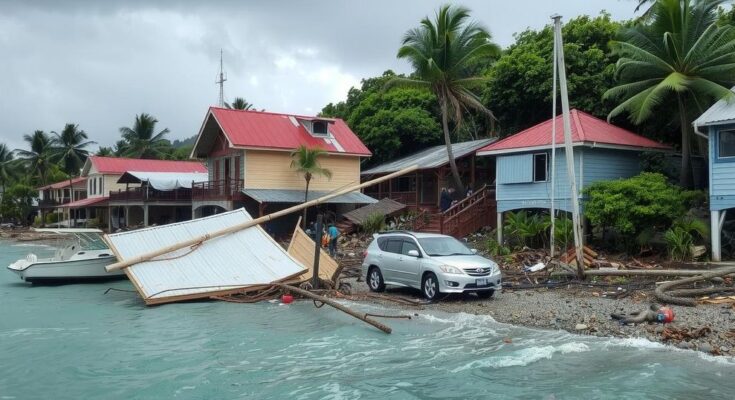Cyclone Chido has struck Mayotte, leading to potentially thousands of fatalities and widespread destruction. The territory faces severe infrastructure damage, including hospital and communication failures. Aid efforts are urgently underway to assist residents, many of whom live in poverty. French authorities predict that the death toll could be extremely high, while local customs complicate accurate assessments of the casualties.
In the wake of Cyclone Chido’s devastation in Mayotte, French authorities have announced that the death toll from this disaster could range from several hundred to potentially a few thousand. This cyclone, the most catastrophic to strike the Indian Ocean island in over nine decades, resulted in significant destruction, severely impacting infrastructure. François-Xavier Bieuville, an official in Mayotte, stated that the actual number of fatalities might never be fully determined due to local customs mandating burial within 24 hours of death.
The cyclone made landfall with wind gusts reaching 140 miles per hour and caused storm surges of up to 28 feet, leading to widespread damage. The main airport has been closed to civilian flights due to the destruction, with only military aircraft currently permitted to operate. Furthermore, the island’s primary hospital has experienced severe flooding, affecting critical care areas such as surgery and maternity wards.
The French Red Cross has characterized the situation as “unimaginable,” initiating rapid responses that include the distribution of drinking water and hygiene supplies. Communications infrastructure has suffered extensive damage, leaving most of the island without electricity, except for Mamoudzou, the capital. Help is being coordinated from France and nearby territories, with emergency teams urgently working to locate survivors amidst the wreckage. Mayotte, one of France’s poorest regions, has faced additional challenges, as many residents reside in vulnerable housing now rendered uninhabitable.
Mayotte, situated in the Indian Ocean near the southeastern coast of Africa, is home to over 321,000 individuals and is among France’s poorest territories. The island has garnered attention previously for its immigration issues, particularly concerning asylum seekers from the Comoros Islands. Cyclone Chido, which recently struck the territory, has compounded the existing socio-economic challenges faced by its residents, many of whom live in shantytowns. The cyclone represents an unprecedented natural disaster for the region, emphasizing the vulnerability of the island and its population.
In conclusion, the aftermath of Cyclone Chido has thrown Mayotte into a state of crisis with potential fatalities in the thousands and extensive damage across the island, particularly affecting essential services and infrastructure. Authorities and aid organizations are working tirelessly to assess the situation and provide necessary support. The disaster highlights the pressing need for improved resilience and preparedness in this vulnerable region, even as it navigates ongoing immigration debates and socio-economic challenges.
Original Source: www.forbes.com




